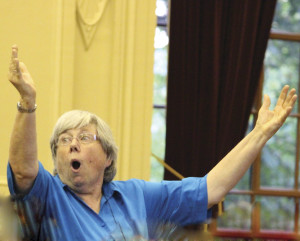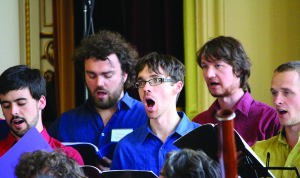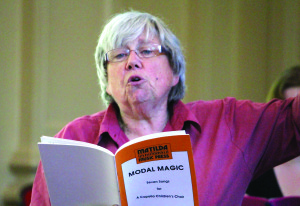“So Good a Thing….”, Pursuing the Dream of a Lifetime
A celebration of fifty years of inspired music-making by Judith Clingan in Australia
Extracts of an interview between Judith Clingan and Stephen Leek – composer, conductor and former singer with JC
How do you begin to describe a person who has single handedly changed a musical landscape? Through grit, sheer determination and a very large dose of humility, Judith Clingan, (Judy) is a maverick who has inspired several generations of composers, musicians, instrumentalists, artists, designers, theatre directors, writers – and primarily working in a community-based setting, has achieved all this largely without recognition and without the self-promoting media circus.
In this recent celebration in Australia’s capital city, three days featured over 700 musicians ranging in age from 2 to 102, more than 200 works, 97 Australian compositions, 17 concerts, 8 workshops, 5 Forums and 2 events. An expansive visual display documented glimpses into the extent and breadth of Judy’s work and influence – as founder, director and conductor of some of Australia’s finest children’s choirs starting back in the 1960s – as composer and commissioner of new work, and mentor to young composers – founder and director of the first versions of choral music summer schools in Australia, …. and perhaps most importantly, someone who has built communities and nourished the lives of many individuals through the art of choral singing.

SL: “So Good a Thing…” was an incredible celebration of your extraordinary music-making. Though the standard of all performances were extremely high, there was a great sense of fun and community and, dare I say, “love” in the hall. The total experience was quintessential “Judy”….
JC: I felt humbled and blessed that so many musicians happily gave their time, energy and expertise to create such wonderful performances. As each performance unfolded, I was able to observe people who used to sing with me years ago, and privately contemplate where their artistic lives have taken them and consider what small part I may have played in this development.
I have never sought the tin gods of fame and fortune, and none has been granted to me! But every year of my life, through my choral work, a large number of people have realized that making beautiful music together is a most meaningful activity – many have decided to devote their lives to it. My compositions are designed “for singing” and these too have reached people in the most unexpected places. I am very honored to have had the opportunity to meet and work with people who go on to make an impact on the artistic world.
SL: Throughout “So Good a Thing” there were many samples of your compositions for young people, amateurs and professionals, and many compositions by composers who have grown up in one of your many groups over the years – some of them now very distinguished. In my experience working with you, we always seemed to be composing, drawing, acting, moving, dancing – engaged in music-making in a holistic way.
JC: I love all art forms and believe that all art springs from the same well – used together they can be powerful expressions of how we feel … in all forms of art there are ways in which we can tell our stories, express our hopes and fears … by nurturing creativity in many genres we can assist people in their quest for the tools that they can use best. There is a need to give young people, and all people, the tools to express their deepest feelings. I believe that in all art we need to pursue a double learning path – exploring what others have done before and taking our own steps towards expressing ourselves.

SL: How important do you think choral singing is to a child’s development?
JC: Singing should be our musical mother tongue. All children should sing, daily – at home and at school. This is a really important aspect of human development. Singing choral music (with other people) uses every facet of our human-ness, helping to develop our social awareness, to work as a team, to use our ears, eyes, voices, bodies, imaginations, spirits, intellects; and it gives us a sense of hope, wellbeing and purpose. Those who have never experienced good singing – particularly with others in parts – have no idea of the empowerment, fulfillment and “humanity” of such a simple activity. Wouldn’t it be great if all our political leaders sang?
SL: I have noticed that people who have worked with you over the years often develop a number of qualities such as motivation, energy, teamwork, co-operation, and musical attributes such as music reading skills, good pitch and rhythm.
JC: Fifty years ago these things happened accidentally just as a result of what I did. Gradually I began to look at music education as an art and a science. I studied Kodaly’s approach in depth in Hungary; I attended every possible workshop I could in the Orff and Dalcroze methods. I came to understand that literacy in music opens doors to a wealth of exciting possibilities, so I began to consciously teach music literacy as a normal part of what I did. Experiential music-making is great, and fun, but it must not be at the expense of music literacy and aural skills. For over forty years I have aimed to mix performance and composing skills into rehearsals.

SL: Often in your groups, different generations sing alongside each other. The Wayfarers for example in 2012 undertook a nine-month world tour. Here, singers of all ages toured, lived and performed together for an extended period. What did you learn from that experience?
JC: It was fascinating, challenging, humbling and rewarding. The music-making we shared derived its strength from the mix of ages: young people brought freshness, zest for living, a sense of fun, irreverence, occasionally new ideas; older people brought steadiness, awareness, concentration, hard work, and also thinking about the necessity for a good afternoon tea! I learned that people can be wildly different from each other in terms of staying power, doggedness, focus, vocal strength, coping in new situations, the need for sleep etc. It was necessary for me to urge everyone to put the group’s needs above their own. I certainly learned a few things about group dynamics. I am currently preparing for a four-week tour this April, bringing together people from Australia, Germany, India, China, Taiwan, to rehearse my opera, “Marco”, together in Taiwan and Japan.
SL: You have listed amongst your alumni many influential figures not only in choral music and composition, but also in theatre, literature, dance, design etc. How important do you think it is to have a diverse choral/musical experience when you are young?
JC: People who had experiences with me in the Canberra Children’s Choir, in the summer music schools, in Gaudeamus, in Wayfarers, I believe the direction their lives have taken has been influenced in some way by these activities. These activities for young people were quite diverse – and these experiences for young people in that most impressionable period of their life, their teens, has clearly been formative.
I believe that choral music truly has the ability to make people feel engaged, to forget their grievances, to be part of something greater than themselves, but also offers singers a place for individual support, nurturing and courage. Choirs are usually strange conglomerates of personalities, types and characters. There have been several times where the motivation of choral singing and the personal intervention of the conductor or choristers has been enough to bring people back from the brink – enough to give someone a new outlook on life, a new direction and motivation of hope. Society is often quick to judge those that are different and the art of choral singing is certainly a powerful way to engage and support the individual when times get tough. I love choral music with a passion and have been very honored to be able to pursue my love for over fifty years. More importantly perhaps, I have been honored to have such rich personal and collective shared experiences through choral singing. I am always excited about where choral music can take us. Perhaps choral singing is the closest that humans ever get to transcending to whatever is beyond.
Edited by Aaron Kircher, USA, and Gillian Forlivesi Heywood, Italy